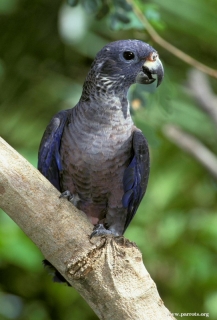Dusky Parrot |
|
|
Also known as: Dusky Pionus, Little Dusky Parrot, Violet Parrot, Violaceous Parrot
Photos
View in GalleryDid You Know?
In the field Pionus parrots can be distinguished from other species by the distinctive wing beat which is strong and deep - so deep, in fact, that the downstroke results in the wings touching each other beneath the bird.Academic Research
Related publications: Pionus fuscusSpecies Profile
Genus: Pionus | Species: fuscus
Size:
26cm (9.75 in)
Weight:
179-222g (6.2-7.8 oz)
Subspecies including nominate:
one
Colour Adult:
Both adults head grey/blue; red spot on both sides of forehead; ear coverts black; feathers of throat and neck tipped with dusty white; chin brown/blue, the feathers edged with pink; upperparts dark brown with pale margins on feathers; underparts brown, the feathers edged purple/red or red/blue; under tail coverts red; tail dark blue with red at base. Bill dark grey with yellow at base. Eye ring bare and pale grey. Eye brown.
Colour Juvenile:
As in adults but with some upper wing coverts edged with green; secondary feathers tinged with green. Eye ring bare and white.
Call:
Calls while in flight or perched said to be high-pitched and nasal. Also calls with ringing tone and pauses between.
Listen NowVideo Links:
Video 1More Information:
Content Sources:
CITES
BirdLife International
Cornell Lab of Ornithology/Birds of the World
A Guide to Parrots of the World, Juniper and Parr, 1998
ML Media Collection Catalogue 115035, Dusky Parrot Pionus fuscus, Marantz, Curtis, Para, Brazil, Sep. 19 1999, Cornell Lab of Ornithology. Site
Pionus Parrots, Stoodley and Stoodley, Bezels Publications, 1984.
Parrots of the World, Forshaw and Cooper, 1989. 2010 edition
Parrots of the World, Forshaw, 2006.
Parrots in Aviculture, Low, 1992.
Psittacine Aviculture, Schubot, Clubb and Clubb, 1992.
Photos
View in GalleryDid You Know?
In the field Pionus parrots can be distinguished from other species by the distinctive wing beat which is strong and deep - so deep, in fact, that the downstroke results in the wings touching each other beneath the bird.Academic Research
Related publications: Pionus fuscusSpecies Care
Captive Status:
Rare until the 1970s when small numbers have been imported from Guyana.
Longevity:
25 yrs
Housing:
Aviary or suspended cage, minimum length 2 or 3m (6.5 or 9.8 ft).
Diet:
Fruit such as: apple, pear, orange, cactus fruits, bananas, pomegranate, etc, forming about 30 percent of the diet; vegetables such as: carrot, celery, green beans and peas in the pod, corn; green leaves such as: Swiss chard, kale, lettuce, dandelion, chickweed, sowthistle; spray millet; small seed mix such as: canary, millet, and smaller amounts of oats, buckwheat and safflower; limited sunflower seed; cooked beans and pulses; complete pellet.
Enrichment:
Bathing, puzzle toys, bird safe chewables (pine, fir, sterlized pine cones), vegetable tanned leather chew toys, swings, ladders, gradual socialization.
Nest Box Size:
Vertical box 12" x 12" x 18" (30.5cm x 30.5cm x 46cm) or 12" x 12" x 24" (30.5cm x 30.5cm 61cm).
Clutch Size:
4-6
Incubation Time:
26-28 days
Fledging Age:
9-10 weeks
Hatch Weight:
9g (0.3 oz)
Peak Weight:
Not recorded.
Weaning Weight:
Not recorded.
Photos
View in GalleryDid You Know?
In the field Pionus parrots can be distinguished from other species by the distinctive wing beat which is strong and deep - so deep, in fact, that the downstroke results in the wings touching each other beneath the bird.Academic Research
Related publications: Pionus fuscusSpecies Wild Status
World Population:
Unknown, decreasing.
IUCN Red List Status:
Least Concern
CITES Listing:
Appendix II
Threat Summary:
Not globally threatened. Fairly common throughout range, however, is likely to have declined in S and E of range due to widespread habitat clearance. Apparently abundant in Pará in the 1910s, less so now. Little to no evidence of local or international trade involving Venezuela and Guyana.
Range:
E Venezuela, along lower Rio Caura and Sierra de Imataca to upper Rio Cuyuni and Sierra de Lema, N Bolivar, and Guianas to NE Brazil, north of the Amazon River from Amapa inland to Rio Negro and south of Amazon River from NW Maranhao inland to lower Rio Madeira; also on western slopes of Sierra de Perija, Guajira, N Colombia.
Habitat:
Chiefly lowland rainforest and humid forest in foothills; terra firme forest, várzea and igapo (permanently flooded forest). Also seen in savanna, coastal gallery forest and cultivated areas. Found up to 1200m (3936 ft).
Wild Diet:
Feeds on seeds of Eschweilera subgrandulosa and Micropholis melinoneana.
Ecology and Behaviour:
Seen in groups, especially outside the breeding season. Feeds in canopy but may go lower to feed on fruiting trees.
Clutch and Egg Size:
4 elliptical eggs, 36.0 x 29.0mm (1.4 x 1.1 in)
Breeding Season:
February-May depending on location. Nest is in tree cavity.
Related Links:
Photos
View in GalleryDid You Know?
In the field Pionus parrots can be distinguished from other species by the distinctive wing beat which is strong and deep - so deep, in fact, that the downstroke results in the wings touching each other beneath the bird.Academic Research
Related publications: Pionus fuscusMembers Only Resources
Please log-in now to find more research, resources and tools.
Not a Member?
Find more great information:
Gain exclusive access to 600+ pages of additional research, seminars and podcasts, specialists to ask your toughest questions, and dozens of other fun resources - when you become a WPT member.
Join Today >>

































